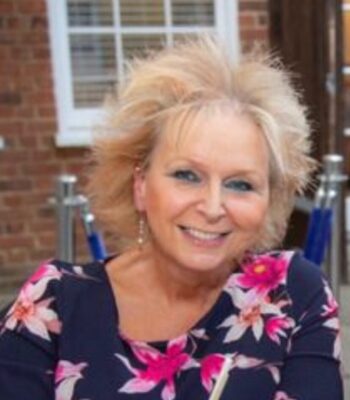Debbie was diagnosed with Hodgkin’s lymphoma in 1985 and had radiotherapy treatment to a significant area of her head and upper body – from under her ears to her armpits. Now 64, she is both grateful to be a first-generation survivor from that time and keen to campaign for better late effects services for survivors.
In 1986, radiotherapy saved Debbie’s life.
 It gave her the chance to beat Hodgkin’s lymphoma, start a family and embark on a busy and fulfilling career.
It gave her the chance to beat Hodgkin’s lymphoma, start a family and embark on a busy and fulfilling career.
But the treatment has also left her with severe late effects. In the last ten years Debbie has undergone extensive open-heart surgery, and in January she had two stents fitted after a heart attack. Her thyroid is severely compromised and fibrosis of the lungs makes her very short of breath.
Debbie, who is a dental therapist and hygienist, explained: “The treatment was considered groundbreaking at the time.
“If I’d been diagnosed five years earlier, I would have died. I want to stress that there was no negligence here. The NHS did a great job, and has continued to do so caring for me with my late effect complications.”
Services for cancer survivors
“My point is that in 2025 there’s no support or information for someone like me, who was treated in the 1980s. I want to change that. I want to change the world so it’s much better for cancer survivors and they get far better outcomes.”
Debbie’s late effects began to worsen in her early 40s and a forward-thinking cardiologist told her she needed to follow a programme of ‘aggressive prevention’ if symptoms developed – to catch and treat late effects quickly. But the symptoms to look out for were not discussed with Debbie, and were possibly not known at that time.
Ten years on and a referral to a chest clinic for a persistent cough led Debbie to learn she had atrial fibrillation and severe cardiac complications, including having one heart valve akin to that of an 80-year-old. Major open-heart surgery followed.
Debbie said: “I can’t really say there’s been a preventative approach to my care. I would really like to see the information known by cardiologists shared with every GP. I think it would help a lot of people who might need to be put on statins at an early stage.
“My GP and cardiologist have been amazing, but my GP told me they didn’t know cardiac problems were a side effect of radiotherapy at the time of my diagnosis.
“My aim is to help anyone like me understand that their health problems could well be linked to the radiotherapy treatment they had all those years ago. If they know, they can push their GP to refer them to a cardiologist early and get the care they need.
“I’m also thinking about all the young people having radiotherapy today and what services will support them in the future.”
The impact of late effects
Debbie says her severe late effects have had a profound effect on her life.
She said: “I’m not depressed, I’m exhausted. And as I get older it’s becoming difficult to bounce back, especially after the heart attack. People like me need emotional support, as the emotional toll affects our physical recovery. I get out of breath walking to the bottom of the garden and it can cause me a lot of anxiety.
“I’m 64 but I’d like to think that I can make it to 74! I’ve had my children and a really good career which is wonderful – I’m genuinely so grateful for the care I’ve had. But I want to help other people like me to understand and recognise the late effects of radiotherapy. Especially if they were treated many years ago as I was, before more modern techniques came in that can prevent such impactful late effects.”
